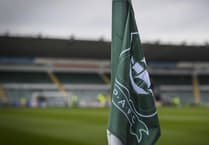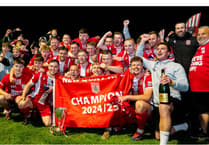By Nigel Walrond
THE official opening of the newly-refurbished main grandstand at Plymouth Argyle’s Home Park in some ways could not have been better timed.
After a number of test events, the Mayflower Stand was fully up and running for the first time on January 1, when the Pilgrims entertained League Two leaders Swindon Town in a big match at the top of the table in front of more than 15,000 people.
It was also day one of the year that marks the 400th anniversary of the historic voyage in 1620 of the Pilgrim Fathers on board the Mayflower ship from the UK to the ‘New World’ of America, with the ship having always formed the centrepiece of the club’s badge.
It has been a long process to complete the £6.5m redevelopment and expansion of the main grandstand, which holds so many memories for so many people.
But the last few months of the delivery of the project could not have been in much safer hands than those of Argyle’s chief executive officer, Andrew Parkinson, who took on his current role from Michael Dunford in May 2019, but who joined the Pilgrims’ staff initially as head of conferencing, hospitality and events 13 months ago.
He was operations director at Liverpool Football Club from 2011 until 2018, where he was responsible for the overall customer experience at the club, which included ticketing and stadium operations, plus the Anfield museum and tours, and he was also involved in the £100m redevelopment and expansion of the main grandstand at Liverpool, which increased the stadium’s capacity by around 8,500.
‘The process has gone really well,’ Parkinson told the Cornish Times as he sat in the impressive new hospitality area looking out at the pitch at Home Park.
‘We have got a first-class facility, which means not only will we be able to offer fans and hospitality guests a fantastic experience on match day, but we will be able to widen that to being a 365-days-a-year offering, which is well needed.
‘Over the last year, the team involved in this have worked incredibly hard to get it to this point.
‘As with any construction, there is always a bit of time pressure, and contractors will say, when you first start off, that they are going to get it done by a certain time, but inevitably things will crop up, but it worked out really well being open before Christmas for test events, and then finally open with a 100 per cent capacity for the Swindon game on New Year’s Day.
‘Part of the safety and test conditions from a licensing point of view are to hold the test events, and increase the capacity of the stand gradually, but from an operations point of view, it has added benefits because you can climb into it gradually.
‘It was the perfect way to start 2020, apart from the result, which wasn’t the best (Swindon won 2-1)!
‘We originally planned to be open a little bit earlier, but the way it all came together, on January 1, the first day of the Mayflower 400 year, and the fact we had a top-of-the-table clash, meant we had more than 15,000 people in that day, which is a great crowd in many leagues, and not just League Two, and I think people came because they are very proud of what has been delivered here, which is great.
‘Like anything, there is a nice swan on the surface but, underneath, there are some ugly legs going round and round, and it is a lot of hard work, but we have had overwhelmingly positive comments.
‘We need to remember that it is the old stand that has been redeveloped, and with that it does mean it includes the whole integrity of the original stand, but it has been modernised too.
‘If you were building the whole stand again, you would have some things that were perhaps better, but you would also have things that were not as good, so I think, overall, we are really pleased with how things have gone.
‘Of course, we are still learning and there are still things we need to work on, but this allows us to make it a match-day experience, rather than just an hour and a half before kick-off.’
The new stand, and the ability to offer facilities for 365 days a year rather than just on match days, is crucial to the future of Plymouth Argyle, and their aspirations to rise up the divisions.
It means income can be brought in all year round, rather than just when the Pilgrims are playing their guaranteed 23 home league games each season, and that can ultimately be put back into the squad and help them to compete with other clubs financially.
The perfect template is just up the road at Exeter Chiefs Rugby Club, where they get a huge amount of income from their conference and banqueting facilities that help bankroll the rugby operation, and they are just about to build a new four-star hotel to supplement that.
‘Ultimately, we are no different to every other football club, and that is about putting 11 players on the pitch, but behind that there is a lot that needs to be done,’ said Parkinson.
‘Football is about trying to be sustainable too, so we have got to generate income from where we can in order to be able to get the players on the pitch and be competitive, and therefore sources of income are really important.
‘In the Premier League, you rely heavily on television and media income, whereas in Leagues One and Two you have got to be self-generating really.
‘A lot of that comes from your attendances but, importantly, what you do when football is not being played, and given the fact we play here 30-odd times a season when you take in all the matches, that means you have 300 other days you have got to do something with, and if you don’t do that, it is very difficult for you to generate that income, and be able to compete.
‘This means we can do hospitality, conferencing events, weddings, pretty much anything, and we have got a space here that can be adapted for different things.
‘We have also got the benefit of other rooms, like a boardroom and players’ lounge, and on a non-match day they can be used as well, so it is about having that whole suite of different options and propositions.’
The stand might only have just opened, but Parkinson said the bookings for events were already looking ‘really good’.
‘We are already above where we wanted to be, which is good, and we will be looking to generate around £500,000 of income from here every year,’ he said.
‘We are in a good location, we are near enough to the city, and I think we are able to offer something that perhaps other venues don’t have.
‘We can accommodate up to 440 people, and I think there is only one other place in the city that can offer that.’
There is also the novelty of staging an event at a football ground.
‘You are not just looking at a room with four walls. Here you are looking out onto a pitch and everything that comes with that.
‘It doesn’t need to be just for football supporters, of course. Anybody can book this facility, but I think we can also add something to that experience, and with the right package we offer trips around the changing rooms and site tours, and it really does add to what people want and it is something a bit different.
‘We have got everything booked here from conferences to murder mystery nights, to leadership events where manager Ryan Lowe is doing a talk, and end-of-season player awards, and the variety is endless really.’
Argyle are also offering two big concerts this summer, with Little Mix and Westlife coming to the venue on July 3 and 4 respectively, following on from previous successful events staged at Home Park.
‘We have dabbled with concerts before, but this year I think I am right in saying we will be doing back-to-back ones for the first time, using the summer window, and I think that will become a flavour of things in the future.
‘Not forgetting, though, we want to use the place for community events too, and there is a lot that will happen in the summer, but we are also really keen to do more open training sessions, and we did one last year and we are looking to do another one in the next few weeks.
‘That all becomes part of not just being an element of business and sport, but also being part of a city and fundamentally a part of the community.’
The opening of the new facility has also coincided with the form on the pitch rocketing in the right direction, with six wins in their last seven league games propelling Argyle into fourth place in the League Two table and just one position outside the automatic promotion spots.
‘With anything that’s new, it usually takes some hard work to get things as you want them, and they have worked incredibly hard on the pitch to get things right. We are playing very differently to how we were playing last season, and there are new people here on and off the pitch, and it seems to be coming together now, which is really good, said Parkinson.
He has just recently gone past his first anniversary of being at Home Park since moving from Merseyside, so how has he found his first year in the South West?
‘I first came here in an interim role to look at the hospitality side of things for the new stand, and I have been chief executive officer since, unfortunately, the day we got relegated from League One!’ he commented.
‘I have really enjoyed it. It is a really great place. I love the city, the people and the fans.
‘It is a word that is used a lot, and you have got to be careful when you use the word “potential” but, nonetheless, it does feel it is a really good time to be here.
‘We have got a great blend of people who have been here a long time and have got all that history, but we have also got a team behind the team who are quite new, whether it be the chairman, who is relatively new, myself, and lots within the team across all the different functions of the club we have, and with all that coming together and everyone pulling in the right direction, it has been a great time to be here.’
You would imagine it has been a huge difference for Parkinson to where he was before at Liverpool, but he added: ‘Yes and no.
‘I was operations director at Anfield, so that was overseeing the development of the main stand there but also doing things such as match-day hospitality and catering, but it wasn’t a CEO role, so this is a wider brief for me.
‘In terms of scale, Liverpool are a bigger club, but in terms of what you have to do, it is the same things, whether you are in the Premier League or League Two. It is about putting 11 players on the pitch, it is about looking after your fans, it is about the commercial and football side of the business, and I couldn’t say it is any less work, it is probably more work in fact.’
On top of the redeveloped stand, Argyle have recently opened their new club shop and introduced digital ticketing so fans do not have to queue up to get tickets.
‘The changes in most businesses over the last five to 10 years, particularly with technology and the way people want to be entertained and engaged with, means you can’t just do the same things.
‘Fundamentally, we have got a product that is about watching football, but on match-day people now expect more from their day, so it is not just about the hour and a half you are watching football, it is also about what do you do before the game – where can I eat and drink, what entertainment can I have? – because you have got choices, particularly with a younger generation as well.
‘We’ll always have people that will come whatever the weather, because they’ve been coming to Argyle for years and years and they are not going to change that, but, equally, we’ve got a lot of younger fans who want to come in and have other choices, so we have to adapt to them and change to them in every way.
‘It is not so long ago that football was about getting people in safely and getting them out safely, but nowadays it is about the whole package: the arrival, the experience you get, of which hospitality is one important area, but it is also the fans on the concourses and outside the ground. It is really important it is a whole-day experience.’




